Does creatine cause hair loss? Current research indicates that creatine does not directly cause hair loss. This article explores the evidence and offers guidance to help you make an informed choice.
Key Takeaways
-
Creatine supplementation can improve athletic performance by enhancing ATP production, but anecdotal reports suggest potential hair thinning in genetically predisposed individuals.
-
Research linking creatine to hair loss primarily revolves around increased levels of dihydrotestosterone (DHT), with no conclusive evidence establishing a direct causation.
-
To support hair health while using creatine, individuals can consider lifestyle changes, medical treatments like finasteride, and natural remedies, while consulting healthcare providers for personalized advice.
Understanding Creatine and Its Uses
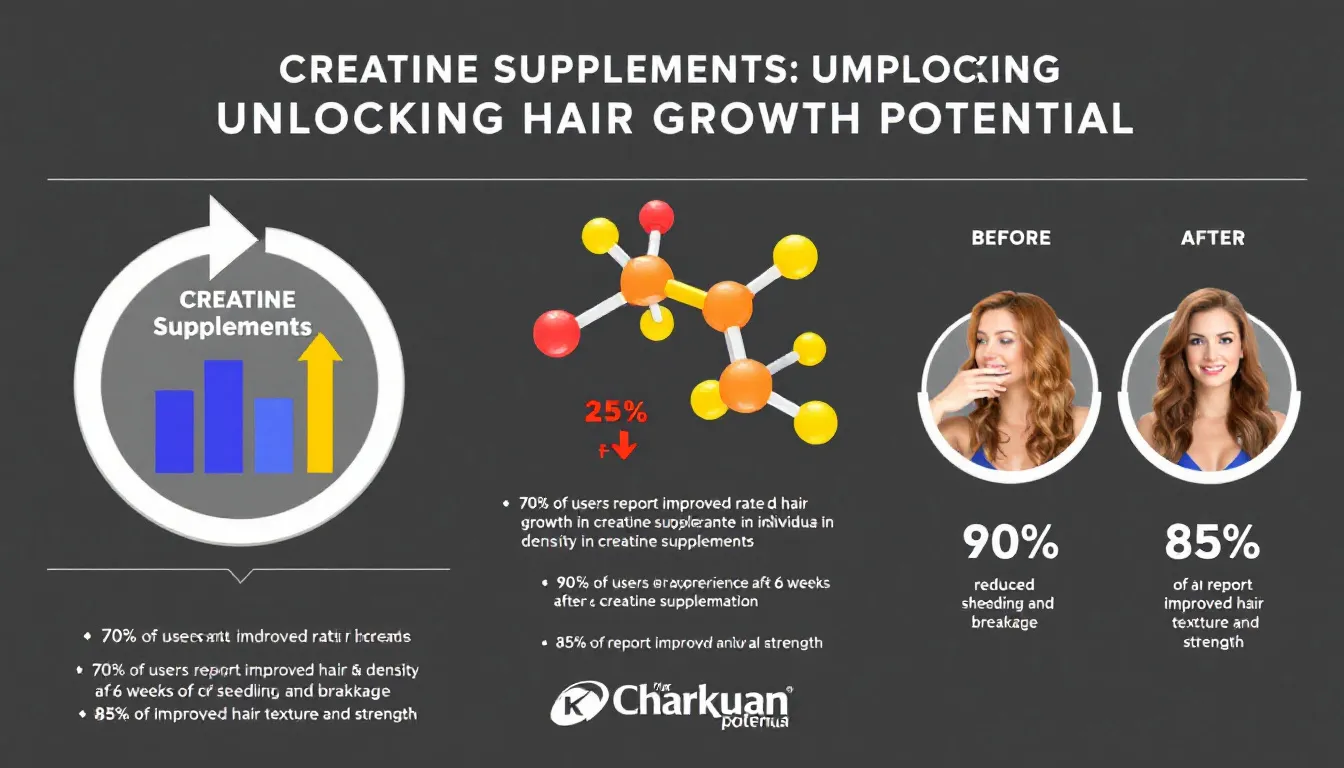
Creatine is a naturally occurring compound that plays a vital role in energy production within muscle tissue. It helps produce adenosine triphosphate (ATP), which serves as a quick energy source during high-intensity workouts. This makes creatine a popular supplement among athletes looking to enhance their performance and increase muscle mass.
Creatine supplementation is known to improve athletic performance by increasing ATP production, allowing for better performance during short bursts of intense activity. Studies suggest that creatine can potentially improve performance by 10-20%. This remarkable boost makes it a go-to supplement for those aiming to push their limits in the gym.
Dietary sources of creatine include protein-rich foods like red meat and some seafood, with the average human intake being around one gram per day. However, to achieve the performance-enhancing benefits, the recommended supplementation is between 3 to 5 grams daily. This dosage helps maintain optimal creatine levels in the muscles, supporting sustained energy production during workouts.
The Link Between Creatine and Hair Loss
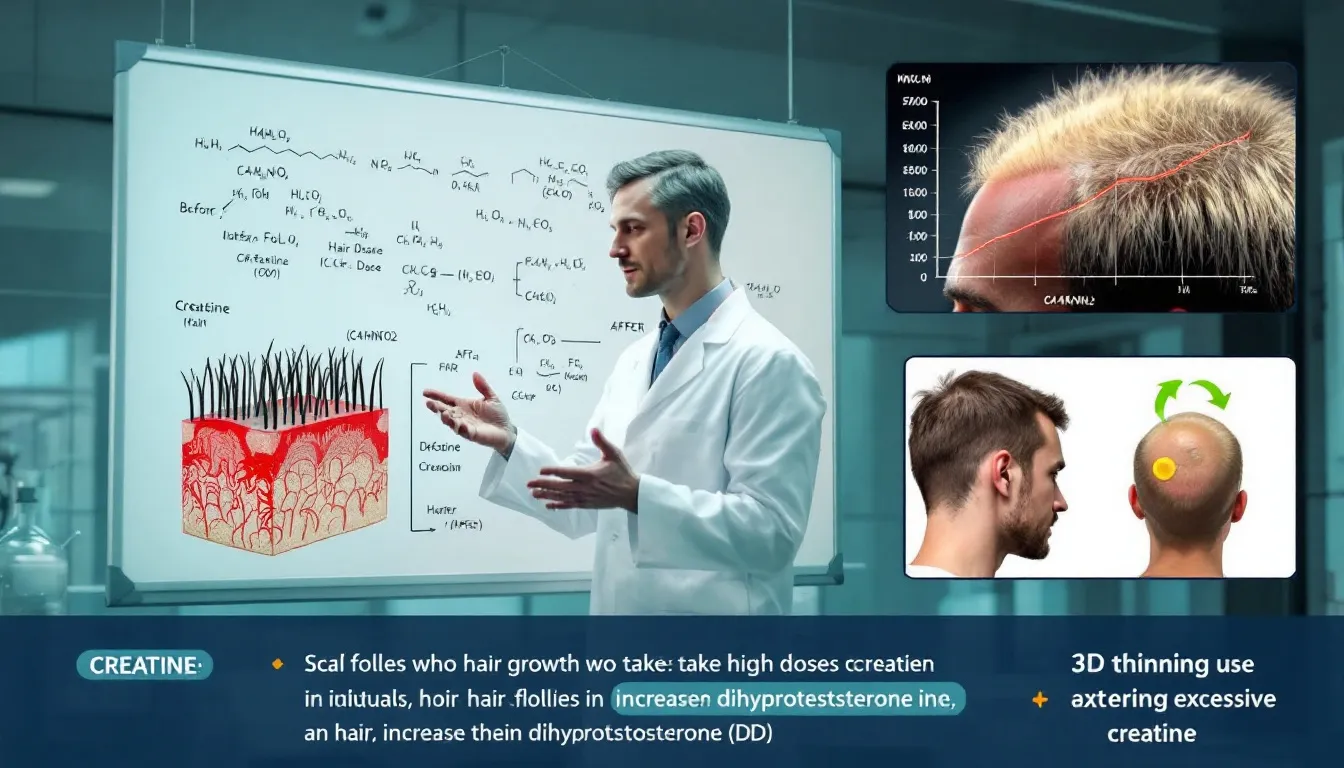
The potential link between creatine and hair loss is a topic of much debate. While some users have reported hair thinning after starting creatine supplementation, the evidence linking creatine directly to hair loss is limited and often anecdotal. Research indicates that in most cases, creatine does not cause hair loss.
However, it’s important to note that a small number of individuals who are genetically predisposed to hair loss might experience thinning hair as a result of creatine supplementation. This means that for some, creatine might accelerate existing hair loss tendencies rather than being the root cause. Understanding the nuances of these claims requires a closer look at scientific studies and biological mechanisms.
Studies on Creatine and Hair Loss
Concerns about creatine and hair loss largely stem from a single study that linked creatine to increased levels of dihydrotestosterone (DHT), a hormone associated with hair loss. This study, conducted in 2009, found that creatine supplementation led to a significant increase in DHT levels. However, these findings have not been universally accepted, and further evidence to support the claim that creatine cause hair loss is lacking.
In one particular study on rugby players, a 56% increase in DHT was reported after one week of creatine supplementation. While this might sound alarming, it’s crucial to understand that such results are not commonly observed. Research indicates that while some individuals may experience hair loss, most do not show a significant relationship between creatine use and hair loss.
Overall, more long-term data is needed to determine the effects of creatine on hair health. Until more conclusive evidence is available, it’s essential to consider the broader context of these findings and not jump to definitive conclusions about creatine’s impact on hair loss.
Biological Mechanisms
Dihydrotestosterone (DHT) is a derivative of testosterone known to play a significant role in hair loss. Some believe that creatine may influence hormone pathways, potentially affecting DHT levels and, consequently, hair follicles. There is no conclusive evidence that creatine directly increases testosterone. Additionally, it has not been proven to cause hair loss.
Genetic conditions such as androgenic alopecia, commonly known as male pattern baldness, can be catalyzed by various factors, including creatine supplementation. However, many health professionals argue that lifestyle factors and genetics are more significant contributors to hair loss than creatine supplementation itself.
The enzyme 5-alpha reductase, which converts testosterone to DHT, plays a crucial role in hair loss. Understanding the interactions between creatine and these hormonal pathways is complex and requires further research to draw definitive conclusions.
Common Side Effects of Creatine
While creatine is generally considered safe, it does come with some common side effects. Water retention is the most frequently reported side effect, which can cause a slight increase in body weight. Drinking sufficient fluids and sticking to the recommended daily dose can help minimize this effect.
Dehydration and muscle cramps are also potential side effects of creatine supplementation. Interestingly, some studies have found that creatine can actually reduce muscle cramping by up to 60%.
Concerns about kidney health often arise with long-term creatine use. While excessive amounts over extended periods can potentially lead to kidney damage and renal dysfunction, research indicates no negative effects on kidney function when taking recommended doses. Following dosage guidelines is crucial to avoid these risks for creatine users.
Managing Hair Health While Using Creatine
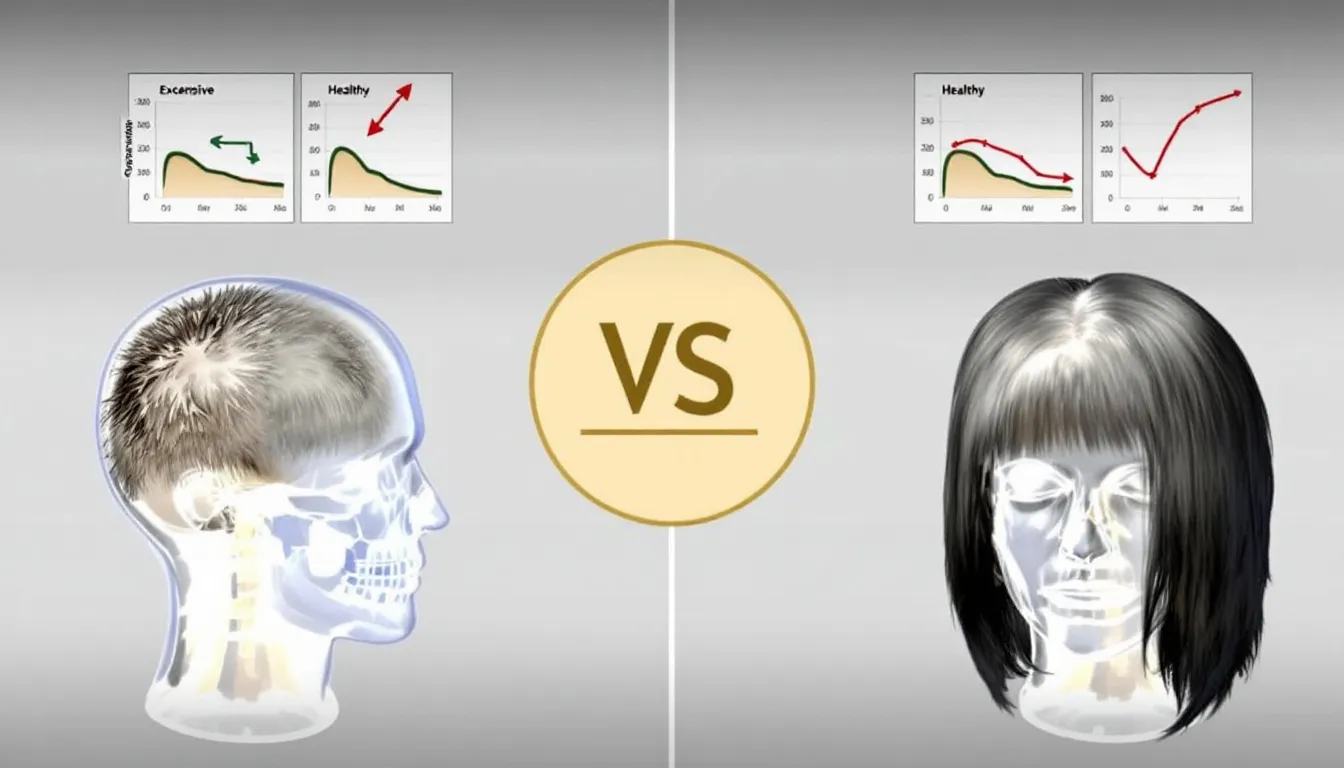
For those concerned about hair loss while using creatine, there are several strategies to maintain hair health. Making lifestyle adjustments and dietary changes can play a crucial role in mitigating hair loss linked to creatine use.
Adopting comprehensive management strategies can support hair health while allowing users to benefit from creatine supplementation.
Medical Treatments for Hair Loss
Medical treatments like finasteride and minoxidil can effectively address hair loss. Finasteride works by reducing DHT levels, which helps prevent further hair loss. Topical minoxidil stimulates hair regrowth and can be applied directly to the scalp.
Dermarolling, a technique that involves using a roller with tiny needles, can enhance the absorption of these treatments, making them more effective. Importantly, these treatments do not interact negatively with creatine, making them suitable options for those concerned about hair health while using creatine.
For individuals experiencing male pattern baldness or other forms of hair loss, consulting a healthcare provider for personalized advice and treatment options is recommended by the rvo health company.
Natural Remedies and Preventative Measures
Natural remedies can also support hair health. Jojoba oil, for instance, can moisturize hair follicles and alleviate inflammation. Green tea, known for its antioxidant properties, may protect hair follicles and promote healthy hair growth.
Elevated DHT levels can lead to the miniaturization of hair follicles, impacting hair growth. Incorporating natural remedies like oils and herbal treatments into your routine can offer benefits for improving hair growth and maintaining scalp health.
Practical tips include regular scalp massages, increasing protein intake, and adding biotin supplements to your diet. These measures can help support hair health while using creatine.
Expert Opinions on Creatine and Hair Loss
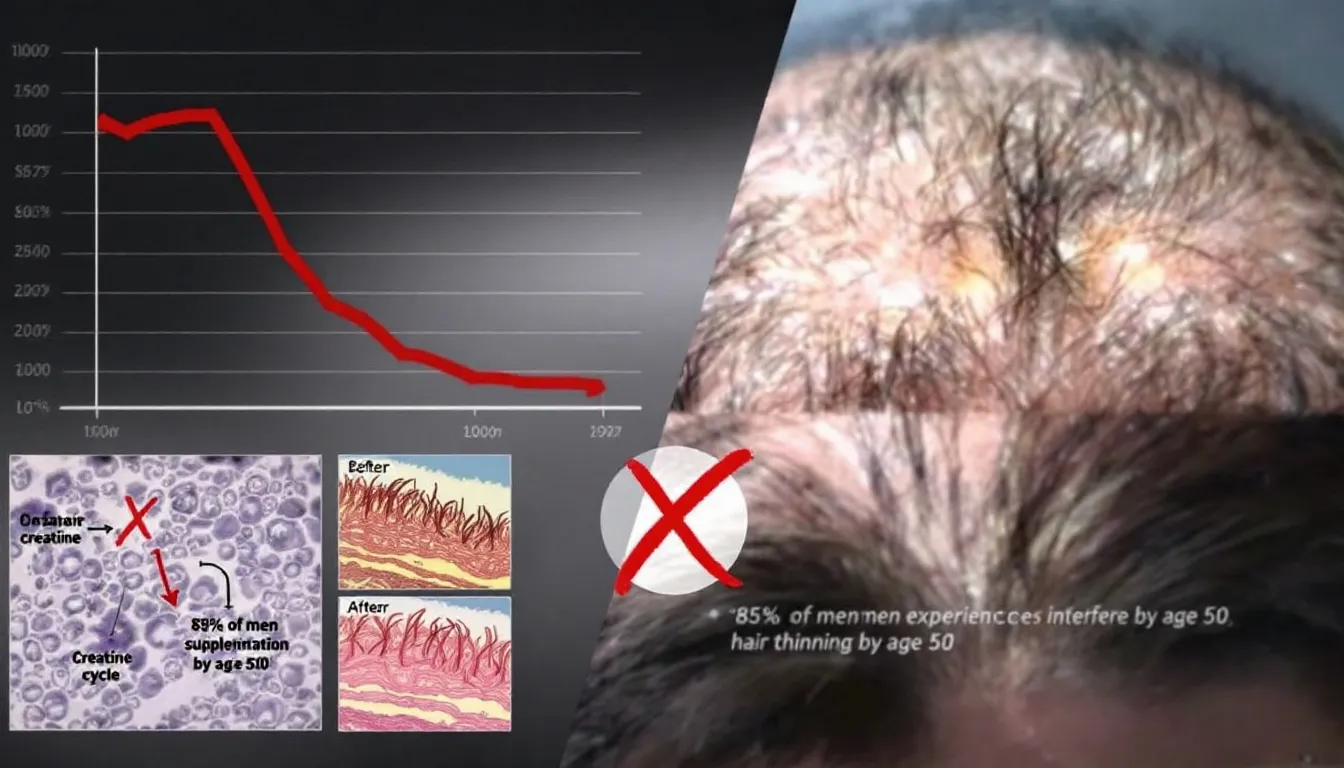
Experts have weighed in on the potential link between creatine and hair loss. Dr. Eric Howell, a board-certified dermatologist, notes that while creatine is not directly linked to hair loss, it can indirectly influence DHT levels, potentially affecting hair loss in susceptible individuals.
Many dermatologists agree that the scientific consensus does not support a direct causative relationship between creatine and hair loss. Increased DHT levels from creatine supplementation are generally small and often remain within the normal range, with the clinical significance still debated among experts.
Healthcare providers emphasize the importance of consulting a healthcare provider before starting creatine supplementation, especially for individuals with a family history of male pattern baldness. Personalized advice can help address any concerns and provide alternatives if needed.
Safe Use of Creatine Supplements
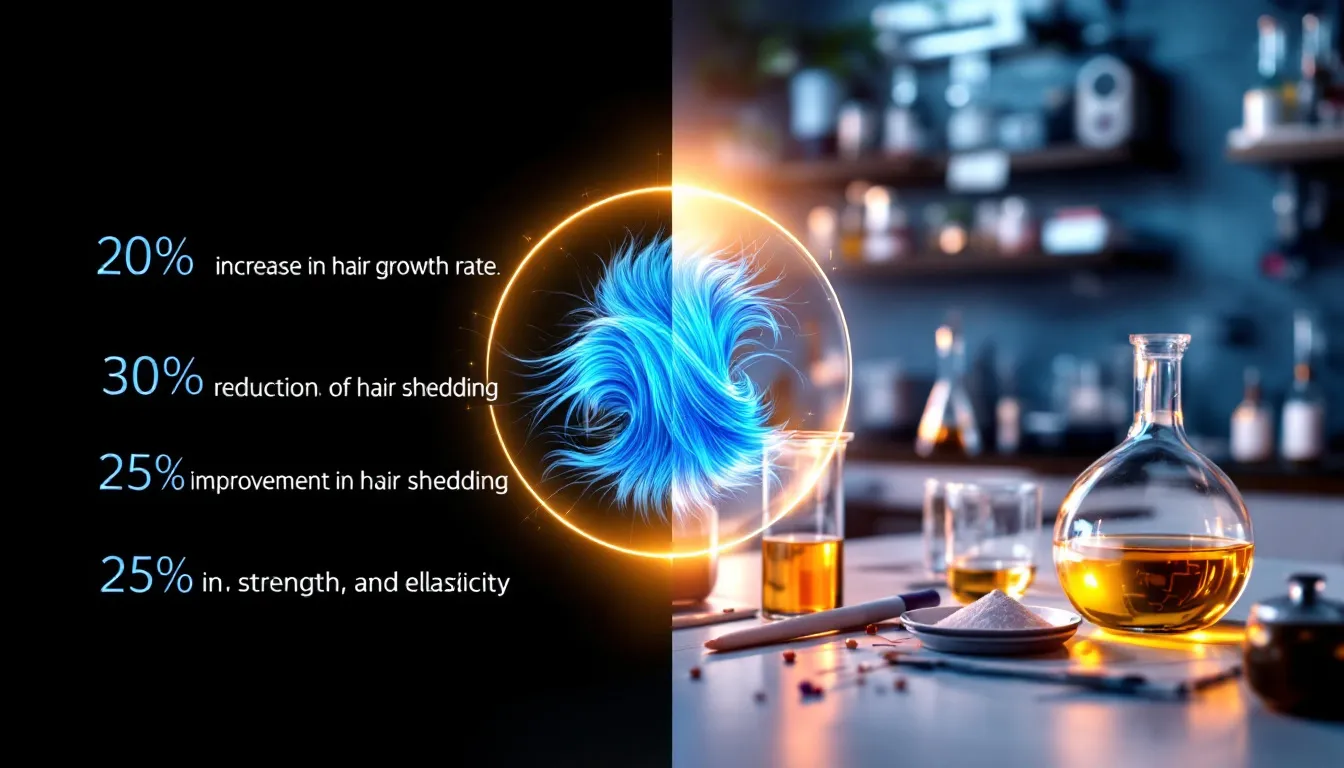
To use creatine supplements and dietary supplements safely, it’s essential to consult a healthcare provider before taking creatine supplements. This ensures that you consider any personal health conditions and receive guidance on proper dosages.
Choosing creatine products that have undergone independent testing can ensure safety and authenticity, reducing the risk of consuming harmful additives. Sticking to a daily dosage of 3 to 5 grams is recommended to avoid potential side effects like dehydration, especially during intense exercise.
By following these guidelines, creatine users can reap the benefits of improved athletic performance and increased muscle mass while minimizing risks, including lean body mass.
Summary
In summary, the link between creatine and hair loss is not conclusively proven. While some studies suggest a potential increase in DHT levels, the evidence is not definitive, and most users do not experience significant hair loss. Factors like genetics and lifestyle play more substantial roles in hair health.
For those concerned about hair health while using creatine, comprehensive management strategies, medical treatments, and natural remedies can help support hair growth. Consulting a healthcare provider for personalized advice is always recommended.
Ultimately, understanding the nuances of creatine supplementation and its potential effects allows users to make informed decisions and continue their fitness journeys with confidence.
Frequently Asked Questions
Does creatine directly cause hair loss?
Creatine does not directly cause hair loss, as most studies indicate no conclusive evidence linking the two. You can use creatine without worrying about it affecting your hair health.
Can creatine increase DHT levels?
Yes, creatine supplementation may increase DHT levels, although the clinical significance of this increase remains under debate among experts.
What are the common side effects of creatine?
Creatine can commonly cause water retention, dehydration, and muscle cramping. Adhering to recommended dosages and ensuring proper hydration can help mitigate these side effects.
How can I manage hair health while using creatine?
To manage hair health while using creatine, consider medical treatments such as finasteride and minoxidil, along with natural remedies like jojoba oil and green tea. These strategies can help promote healthier hair.
Should I consult a healthcare provider before taking creatine?
Yes, it is important to consult a healthcare provider before taking creatine to ensure it is safe for your individual health needs and to get advice on appropriate dosages.

